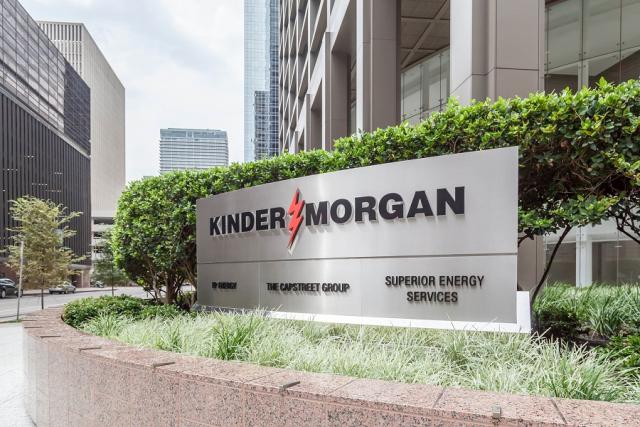
Pipeline giant Kinder Morgan’s second-quarter earnings fell short of forecast due to lower commodity prices. (Source: Shutterstock.com)
Dropping commodity prices cut into Kinder Morgan’s second-quarter earnings, the midstream giant said July 19.
The company reported overall strong financials and approved a cash dividend of $0.2825 per share. Kinder Morgan (KMI) stock finished up 1.8% on July 20.
“While we are on budget year-to-date, we now expect to finish 2023 slightly below our plan on a full-year basis, all of which can be explained by expected lower commodity prices,” said KMI President Kim Dang, who has been tapped to take over as the company’s next CEO.
KMI’s second-quarter revenue was $3.5 billion, a miss of $1.11 billion from original estimates. The company had projected a higher oil price of $85/bbl and natural gas price of $5.50/MMBtu. Oil prices have not hit $85/bbl since February; they were at $76.90/bbl at midday July 21. Natural gas has remained below $5/MMBtu since the beginning of the year and hit $2.69/MMbtu at midday July 21.
In 2022, second-quarter revenues came in at $5.2 billion, meaning the number dropped by nearly one-third year-over-year. However, the company said the reduction was partially offset as the cost of sales fell by $1.7 billion. Between 2022 and 2023, net income fell from $635 million to $586 million.
The company reported it had taken advantage of some of the volatility in the natural gas market, but it could not predict if it would continue. Also, with much of its storage near capacity, KMI did not expect to have the same amount of flexibility to adjust.
“We haven’t assumed that same level of outperformance in the back half of the year as what we experienced in the first part of the year. And therefore, that’s why we’re saying that we will be slightly down versus planned…,” Dang said.
The company also announced the start of construction on the Markham Storage Expansion project, which will expand the working gas storage capacity at its facility in Matagorda County along the Texas Gulf Coast. The project involves an additional cavern at Markham to provide more than 6 Bcf of incremental working gas storage capacity and 650 MMcf/d of incremental withdrawal capacity on KMI’s Texas intrastate system. The project should be in service at the beginning of next year.
Kinder Morgan operates around 82,000 miles of pipelines in all regions of the U.S., runs 140 terminals, and has 700 Bcf of natural gas storage. It is the largest midstream firm in the S&P 500.
The company’s overall strength in the marketplace means its success is not dependent wholly on commodity prices, executives said during the earnings call, and a diverse number of projects should factor into a strong year.
“Put another way, our business is performing better, and that is partially offsetting the lower commodity prices,” said KMI CEO Steve Kean in his last earnings call in this role.
RELATED: Kinder Morgan: Low Commodity Prices Temper Full-year 2023 Outlook
The CEO pointed out the company had put about $450 million in projects into service over the last quarter, and yet its backlog of projects remained roughly the same—$3.75 billion—from the first quarter to the second, as an additional $500 million in projects had been added.
“These projects are getting done at attractive returns well above our cost of capital,” Kean said. “Notable among the projects brought into service was the first of our Wabash Valley RNG [Renewable Natural Gas] projects.”
Kinetrex Energy, a KMI company specializing in developing RNG, announced last year it would develop three RNG facilities with the Wabash Valley Power Alliance in Indiana. The first went into service at the end of June. The project experienced some delays and was more expensive than anticipated, Kean said, but the company expects to start reaping a solid return on the investment.
KMI continued buybacks as an incentive to its investors in the second quarter, repurchasing approximately 12.3 million shares for $203.4 million, at an average price of $16.57 per share. So far in 2023, KMI has repurchased 19.9 million shares for $329.9 million at an average price of $16.61 per share.
KMI will continue to emphasize natural gas development in its future projects.
“The single most important reason for optimism is the role natural gas will play in this country and around the world in the coming decades,” said Rich Kinder, KMI executive chairman.
Recommended Reading
Exclusive: Sheffield Says FTC Could Rescind His, John Hess’ Bans
2025-03-11 - Former Pioneer Natural Resources CEO Scott Sheffield told Hart Energy that his ban by the Federal Trade Commission from serving on Exxon Mobil’s board "was pretty much illegal. It's a baseless and illegal order that was done.”
Scott Sheffield Sues FTC for Abuse of Power Over Exxon-Pioneer Deal
2025-01-21 - A Federal Trade Commission majority opinion in May barred former Pioneer Natural Resources CEO Scott Sheffield from serving in any capacity with Exxon Mobil Corp. following its acquisition of the Permian Basin E&P.
Pickering Prognosticates 2025 Political Winds and Shale M&A
2025-01-14 - For oil and gas, big M&A deals will probably encounter less resistance, tariffs could be a threat and the industry will likely shrug off “drill, baby, drill” entreaties.
US Tariffs on Canada, Mexico Hit an Interconnected Crude System
2025-03-04 - Canadian producers and U.S. refiners are likely to continue at current business levels despite a brewing trade war, analysts say.
Biden Bans E&Ps from 625 Million Acres of Offshore Oil, Gas Leases
2025-01-06 - While the White House said the move doesn’t affect existing leases, oil and gas industry groups called excluding offshore waters “significant and catastrophic.”
Comments
Add new comment
This conversation is moderated according to Hart Energy community rules. Please read the rules before joining the discussion. If you’re experiencing any technical problems, please contact our customer care team.





